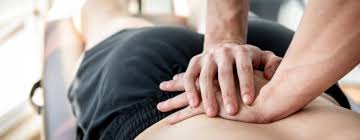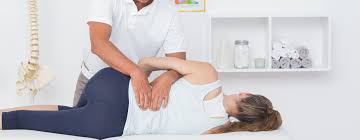How to Relieve Pain from a Herniated Disk?

Herniated disks are a prevalent back injury, and the symptoms can be highly unpleasant. A herniated disk is an issue with the discs that sit between the bones that stack up your spine. A spinal disc is made up of a soft jelly-like center, the nucleus, surrounded by a more rigid rubbery outer layer, the annulus. Also referred to as a slipped or bulging disc, a herniated disk happens when the nucleus partially pushes out through the annulus and presses on the spinal nerves. They can occur in any part of the spine but most commonly in the lower back. Herniated disks can cause pain and weakness in your neck, back, arms and legs, and these symptoms can become unbearable in severe cases.
Symptoms
Symptoms of a herniated disk depend on the location of the disk. For example, if a herniated disc is located in the neck, one will usually feel a burning or sharp pain in their arm and shoulder. On the other hand, if the herniated disk is in the lower back, one will typically feel pain in the legs and buttocks. In addition, people with herniated disks often have numbness or weakness in the body part served by the nerves being affected. Therefore, it is essential to seek medical attention if you experience pain, numbness, or tingling traveling down your arms or legs.
Causes
Herniated disks are usually caused by degeneration caused by wear and tear as we age. This is because as we age, the disks in our back become less flexible and more susceptible to rupturing or tearing. In most cases, people cannot pinpoint what caused their herniated disk. Twisting and turning while lifting heavy objects can cause a herniated disk, as well as lifting with your back muscles instead of your legs. In rare situations, trauma experienced from a blow to the back or falling is the cause.

Pain relief
The severity of disk herniation symptoms varies. Therefore, managing the pain as symptoms begin to show is critical. However, most of the time, issues caused by a herniated disk will improve on their own within a few weeks. That being said, steps can be taken at home to promote relief. To begin with, while your back hurts, rest. Avoid rigorous exercise or any tasks that require bending or lifting. Alternating between applying ice and heat can also be a great way to reduce inflammation and pain. Over-the-counter pain medications can also be a very effective method for temporary pain relief. Sleeping on your stomach can also worsen herniated disk pain. So it is crucial to try and sleep on your back or side to reduce stress on the spine.
Physical Therapy
If symptoms do not improve after a few weeks, it may be necessary to see a physical therapist. There are some exercises and stretches that a physical therapist can teach you to reduce pain. The exercises are designed to relieve pressure and improve the flexibility and strength of the back muscles by reducing stress on the disk. If you are still feeling pain after physical therapy, your doctor may recommend a steroid injection. Most people with herniated disks will want to try to avoid surgery. That being said, you may want to talk to your doctor about surgery as an option if you exacerbate all other treatment methods.
Featured Clinician: Anthony Maritato, PT
FEATURED CLINICIAN: Anthony Maritato, PT Anthony Maritato, PT, MSPT, is a licensed physical therapist and co-founder of Total Therapy Solutions, a private practice outpatient physical therapy business that focuses on
Colleen Rapp Wins Friend of Private Practice Award
Long time patient advocate, Colleen Rapp, was awarded the APTA Private Practice Section’s Friend of Private Practice Award during the 2022 PPS conference. Colleen has long been standing up for
Top Tips for Relieving Nerve Pain
Top Tips for Relieving Nerve Pain If you suffer from nerve or neuropathic pain, then you can certainly attest to how it can throw a wrench in your day-to-day routine.
How Your Diet Can Cause Inflammation
How Your Diet Can Cause Inflammation Depending on the situation, inflammation can be a good thing or a bad thing. It is good in that it is your body’s way
What to Avoid After Knee Replacement Surgery
What to Avoid After Knee Replacement Surgery Knee arthroplasty, otherwise known as knee replacement surgery, is designed to relieve pain and restore function in severely diseased knee joints. No matter
How Physical Therapy Can Help You Avoid Reliance on Pain Medications
How Physical Therapy Can Help You Avoid Reliance on Pain Medications If you suffer from chronic pain, you know how managing pain can be a real challenge. Another day, another
Kyle Yancey
Latest posts by Kyle Yancey (see all)
- Top Tips for Relieving Nerve Pain - October 28, 2022
- How Your Diet Can Cause Inflammation - October 25, 2022
- What to Avoid After Knee Replacement Surgery - October 19, 2022
- How Physical Therapy Can Help You Avoid Reliance on Pain Medications - October 13, 2022
- Physical Therapy for Heart Disease - October 11, 2022
